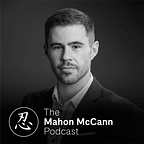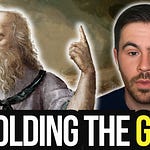Introduction
Last week, we looked at the dimension of meaning in life called coherence, and we saw what happens to mythological villains like Sisyphus and Macbeth who don't honestly pursue the adaptation and try to steal meaning in a sense. The result is a pointless life, which we want to avoid, so how can we have a point in our lives? A purpose? A valued goal? A vision of the good to orient us in the chaos and absurdity of life? This week, we will think about the dimension of meaning in life called purpose.
Defining Purpose
In the psychological literature, purpose is often described as having a meaningful and intentional reason to live, driven by a clear understanding of one’s goals and values (Ryff & Singer, 2008). Purpose encompasses a sense of direction, a belief that one’s actions are meaningful and contribute to a larger scheme of existence. It goes beyond mere goal-setting and achievement, delving into the more profound questions of why one engages in particular activities and what significance these activities hold in the grander scheme of life.
There are two ways of looking at purpose in life: one as the purpose of life, which is a larger religious or theological question, and another, more practical version, which is, how do I increase a sense of purpose in my life? This is the question we will focus on in this essay and in the subsequent essay, addressing those higher-level religious and theological questions.
Increasing Purpose in Life
“Knowing thyself is the beginning of wisdom…”
Socrates
One treatment for depression that Cognitive Behavioural Therapists employ is to get the individual to use a daily planner. In this daily planner, they must write down what they should be doing at every hour of the day. So essentially, you chop your twenty-four hours into hourly blocks and must choose what that hour will be spent doing. A goal for each hour of the day. Even for the time of sleep, the goal for those eight hours is restful sleep.
This might seem like overkill, but there is a good neurochemical reason for this: our positive emotion system is goal-directed. In other words, positive emotions track your progress towards a valued goal, so if you have a valued goal every hour of the day, you will make a massive jump in your positive emotions and increase your quality of life overall.
We tend to consider purpose as a broad, overarching point to one’s existence, like the point of my life is to help people lose weight and look great on holidays. In our quest for complete clarity, purpose becomes reduced to a social or economic function, often leaving people burned out and frustrated when their job or hobby doesn’t scratch that transcendent itch. So rather than starting on the big, abstract level of - what is my purpose in life? We will instead start on the immediate, practical and achievable level of daily life.
My Purpose System
In my early teens, I thought goals were for weirdos. The idea of sitting down and setting goals for myself and pursuing and achieving them seemed fruity, to say the least. However, at the same time, my mental health was falling off the edge of a cliff, my sleep schedule non-existent, and vices bouncing about on my soul like a troop of chimpanzees on a trampoline. The result was a lot of anxiety, depression and a feeling of having little control over my life. Ironically, the answer was humility and reflecting on what the hell I was supposed to be doing and the realisation that peace of mind was the result of discipline and that this mental discipline across time was mediated by goals.
I’ve constructed one of these goal-systems for my own personal use to maximise my positive emotions as much as possible, and I discovered in the constructing of my own system, that you must address some of those bigger existential questions anyway, which is killing two birds with one schedule.
Like all great existential journeys, I started constructing this system using Google Calendar. You can use any calendar, but that one was convenient for me. When you open the calendar, you will see time before you, and I don’t mean to be condescending, your life! Those twenty-four hours in the day are what life is. Oftentimes, when we consider purpose, we get all romantic about living in Prague and painting Shetland ponies, but that blank schedule is really what you face everyday upon waking up.
So, What do you want your day to look like? This was the question I began with. At the time, I was forced to work a brutal customer service job to survive/eat food that was on the schedule for eight hours a day by design. Then, of course, there was the question of waking up at a certain time, eating breakfast, exercising and writing. But firstly, the schedule is where we see the structure of our day and can start to consider what the ideal day looks like for you? Nobody else can answer this question for you, so take a second and consider.
For me, my ideal day is waking up, training in martial arts for an hour or two, then settling down for several hours of creative work, a nice lunch, more creative work and then an evening with the missus or some sort of socialising. This is the good life for me! It might sound like your worst nightmare but that doesn’t really matter. The point is you pick your ideal day and build your schedule around that! The main body of the schedule will be focused around a typical day, so avoid scheduling in sitting on the beach drinking mojito’s five days a week.
Your new calendar brain will help you organise yourself beyond minute to minute and instead think in larger time frames across months, years, etc. Flow, essentially the experience of meaning in life, comes from pursuing a valued goal. So, scaffolding your bigger goals in your daily life means you get the juicy bonus points at the boring parts of the day. So, this is where the second part of the system comes in, which is your long-term goal-setting for your life.
Being vs Having Goals.
I’m trying to think in decades at the moment, so coming to the end of my twenties, I had certain goals: getting my first play produced, starting podcasting, etc., and these long-term goals structured how I behave daily to achieve them. To be a professional football player, you must spend much of your day playing football. The same is true for any longer-term goals, but we can split them into two categories: Being-goals and having-goals. In my opinion, Being-goals are more important than having-goals. Not that having-goals aren’t important - I want to have a house when I’m older, a family, a golden retriever etc. But a having-goal can be accomplished with no significant transformation of your personality, so is ultimately, not as meaningful as a being-goal.
A being-goal is focused on what I want to be in the future. For example, I want to be a father. Therefore, I need to find a girlfriend, wife, and relationship that is moving towards the goal of having children. I want to be healthy, so I need to exercise, eat right, and stay away from those delicious cigarettes; you get the point. The being-goals that you decide are the levels of your future self and can be broken down into micro-routines, challenges, and pursuits which guide you towards bringing that ideal vision of life into being, which is the ethical adventure of your life, and feels meaningful in your pursuit.
So, why doesn’t everyone do this? Most people get stuck on being-goals because they can’t decide what they want to be because to decide to be something is to decide to not be everything else - it’s a sacrifice. It’s aggressive, maybe even cruel to the parts of yourself that have other ideas or no ideas at all. But to become who you are going to be, you need to sacrifice who you are now. Choosing your being goals is a kind of death you experience while alive but prepares you for truly living.
People don’t grapple with these being-goals because they are afraid to make the wrong decision, so keeping the being-goals vague seems like a good alternative, but then you end up as nothing, which is much worse. Not choosing a future self is a guarantee of failure to become anything. You will end up going nowhere! Even thinking about that expression - going nowhere - we use the same cognitive machinery for navigating physical space as we do conceptual space, and so your being-goals are your destination. The type of person you should be is the destination, the type of person you should be.
What kind of person should you be?
The question of who you should be? Is an ethical question; in other words, the question is about the ideal, or what ‘should’ be, rather than what is. Virtue ethics, which I wrote this essay on, argues the central question of all ethics is who should you be? What is your character? What is a good character, and what is a bad character? Who do you get the former and avoid the latter?
Every Virtue Ethic tradition has a different answer to this question. Confucianism takes the Chinese philosopher Confucius as an answer, the Stoics take Socrates as an ideal personality and guide, and for Christians, this is Jesus. A person who is a historicist or a cultural relativist would say that the person you should be is an arbitrary decision based on your social or cultural location - it’s just whichever group you join, and that’s fine. I’m not a cultural relativist because my research has led to a universal conception of human nature across cultures, and so if human nature is universal across cultures, then so would be ethics - ethics is the perfection of human nature, what we should be.
In his book The Republic, Plato took on this project by starting with an anthropology of human nature and then proposing ethics as a cultural solution to our natural flaws. He argued for a Wizard of Oz-esque view of virtue ethics, whereby we need courage because we must face danger, we need wisdom because we are inherently foolish, we need temperance because we like eating lots of grub and we need justice to balance our chaotic minds and bring peace to our ailing souls - on the journey we get what we lack and become whole, unified, like the one. I love all that; it’s such a smooth and put-together system. But I won’t bore you with the details; what is important is that when thinking about who you should be, we use role models who embody these virtues. The role models are real but insufficient, and the virtues are perfect but abstract, so by opponent processing the two, you can start to get a grip on the type of person you should be and get a more fine-grained picture of what being a ‘good’ person means - which is really an insight into the Good itself, which by the way is God, which we will discuss in the next essay. I can’t answer that question of who you should be, but I can indicate that it’s a question of great importance and worth considering and paying attention to in your day-to-day life.
Back to the Purpose System
Once you have a rough version of who you should be, you can think in broader blocks of time. For example, I’m heading into my thirties, and so is my girlfriend, so this time will involve having children - this means I need money, a job, the ability to pursue my creative projects (help). But these challenges give me a purpose; I need to achieve these things before then, or else! So there are stakes to this game, in this case, my relationship suffering, potentially failing and all the associated horrors of that - so I’m incentivised to do a good job and make progress towards my goals.
So now we’re in a good position to start looking at setting up our purpose system, I do this in the notes section of my phone (you can write this down wherever is easiest). The purpose system is a running project, it is not just written once and left but a day-to-day running project which you engage in and develop:
Down the bottom of my note are my longest-term goals, which might be in the next ten or twenty years.
Below that, I have my goals for this year, which I chose after doing an annual reflection at Christmas time on the previous year (I use this one from Modern Wisdom - check it out). For example I did my 2022 reflection and choose my goals for 2023 and keep those goals in a list and tick them off as I accomplish them one by one.
At the front of my notes, I have my weekly schedule. On a Sunday, I write each day of the week and shade in the basic blocks: work, training, and any jobs I’m aware of. I try to think about what my future self needs from me and then I try to schedule this in - this creates harmony between my past, present and future selves, organising oneself across time.
So you can see a coherence starts to emerge in your life, from the higher level vision of one’s future self to how you act at twelve o’clock on a Tuesday, writing this essay, for example. This purpose structure reduces chaos and keeps you pursuing valued goals, which maximises positive emotion and peace of mind - the normal state of mind is chaos, and goals organise the mind.
Conclusion
We all need a motivational vision of the good, and that vision changes as the stages of life change, so we will frequently be thrown into chaos again and again, and there is no silver bullet for this hero’s journey and work. We simply must attend to the gaps in our conceptualisations and rebuild our purpose structure when anomaly emerges, and this is why I think meaning is a warrior practice, it is something you live rather than just an intellectual exercise. It’s a tall order, but human beings thrive with a burden to bear, especially one we share with others as parents, leaders, citizens, and wherever, answering these questions will bring good. I firmly believe addressing these questions puts you in the best place to assist yourself, your culture, and broader civilisation. If you keep fighting, keep making sense, then you get your order back, fleeting as this might, out the other side is the hope that you start to enjoy the challenge and test your mettle against even bigger looming disasters - lord knows our civilisation could do with more people doing that.












